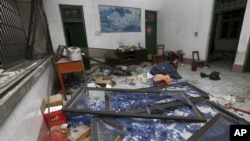A new explosion rocked a residential building in southern China on Thursday, a day after 17 mail bomb explosions killed at least seven people and wounded 52 others.
No one was injured in the latest blast, which damaged a six-story building in Liucheng, in Guangxi province near the Vietnamese border.
The explosion occurred 16 hours after the first of Wednesday's blasts, which targeted 13 sites in Liuzhou, also in Guangxi province.
Chinese media at first reported that a suspect in the bombings had been arrested, but later said only that a suspect had been identified, naming him as M. Wei, 33.
Authorities offered no motive for the attacks but were quick to rule out terrorism, instead treating the explosions as a "criminal case." The blasts occurred amid a wave of unrest involving China's Uighur ethnic minority.
The Chinese state news agency Xinhua said police were looking into whether the suspect had hired others to help deliver the bomb-laden packages.
"There were so many of them, and they were so loud," one hotel worker said of the Wednesday blasts. "They sounded like someone was blasting rocks in the mountains."
More bombs?
Police urged Liuzhou residents not to accept any suspicious packages, and the postal system suspended deliveries until Saturday over possible worries that there could be more bombs in the mail.
The Wednesday bombs struck hospitals, markets, a shopping mall, a bus station, a jail and several government buildings.
A local courier told the Epoch Times newspaper he witnessed the first blast, which tore down a three-story building in Dapu township. That was followed by another three blasts near the business center.
The witness said the township’s animal husbandry staff dormitory was the worst hit, with the compound’s eight buildings flattened.
An employee at the animal husbandry center told VOA that its main offices remained intact. “We still work shifts here while top leaders remain on-site, dealing with the aftermath of the devastation. The blast site is about three to four kilometers away [from the offices],” he said without giving his name.
A supermarket manager, Zhang Qi, told China National Radio that shortly after the first blast, she received a phone call from a township government official, who cautioned her to beware of any suspicious packages. She soon discovered an unclaimed package with the sound of clock ticking inside. She placed the parcel on the cashier’s counter while rushing to evacuate staff and shoppers.
“Ten minutes later, it went off,” she said, adding that there were no causalities but that her supermarket had been turned into a dump site.
Residents said many areas were cordoned off while authorities located a total of 60 packages, which at that time were waiting to be processed by a bomb squad.
Organized effort?
Individuals in China have carried out bomb attacks over local grievances, but the scope of the Guangxi attacks and extent of the damage gave the appearance of a more coordinated effort.
Even so, an analyst said the types of facilities apparently targeted and the fact that the blasts hit a midsize city in a rural area of China suggested that the motivation most likely involved local issues.
“Assuming it is a terrorist group, then they want to actually get the maximum propaganda out of it. Why hit a poor city? Hit one that is famous. Hit an iconic building,” said Tay Hao-giang, deputy president of the Institution of Fire Engineers’ Malaysia Branch.
With the investigation still in the early stages, and no group claiming responsibility, the attacks remained a mystery.




